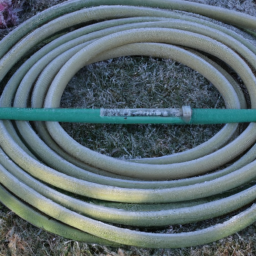Garden Hose What Temp Freezes
What Temp Will Garden Hose Freeze
What Temperature Will Garden Hose Freeze?
It pays to know the temperature at which garden hoses are likely to freeze, since frozen hoses can burst and cause water damage. Knowing what temperature your garden hose will freeze at can help you take the necessary steps to ensure the safety of your hose and property.
What is the Temperature at Which Garden Hose Freezes?
Generally, garden hoses are prone to freezing at 32 degrees Fahrenheit (0 Celsius). In environments with more extreme temperatures, hoses could freeze at temperatures higher than 32 degrees. It is also important to note that a garden hose could freeze even when the temperature is higher than 32 degrees, if it has come in contact with cold surfaces such as metal or water for a long time.
Impact of Freezing on Water Quality
The water quality of a garden hose is also impacted by freezing. When the temperature drops below freezing, water starts to transform into ice. The expanding ice crystals can force water out of the hose, leading to a decrease in pressure. As a result, small contaminants and minerals that have collected inside the hose over time are forced out as well, leading to further deterioration of the water quality.
How to Protect Garden Hose from Freezing?
There are several steps that can be taken to protect garden hoses from freezing:
- Drain the hose completely and store it in a warm and dry place.
- Wrap the hose with insulation material.
- Protect the hose by wrapping it in foam or bubble wrap.
- Apply low-level heat to the hose with a hair dryer.
- Position the hose near a source of heat such as a building.
- Turn off the outdoor water supply and drain the outdoor pipes.
Advantages of Using a Freeze-Proof Hose
Investing in a freeze-proof hose has several advantages over regular hoses. Freeze-proof hoses have an internal core and extra insulation that prevents freezing, even in sub-zero temperatures. In addition to preventing freezing, freeze-proof hoses also help maintain water quality since they are less prone to contaminants and other impurities.
Brief Recap
Garden hoses can freeze at temperatures as low as 32 degrees Fahrenheit. Ice can cause water to be forced out of the hose, leading to a decrease in pressure and water quality. To prevent freezing, it is important to drain the hose before the temperature drops below freezing and ensure that it is stored in a warm and dry place. Investing in a freeze-proof hose can also help protect the hose from freezing.
By following the necessary steps, you can ensure the safety of your garden hose and protect your property from potential damage caused by freezing.

Previous Page
Next Page
